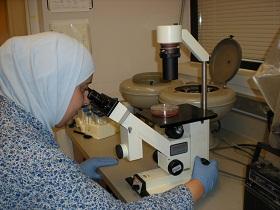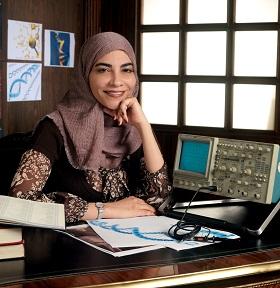Using AI to control energy for indoor agriculture
30 September 2024
Published online 7 May 2013

The number of women studying science surpasses men in most states across the Arab World. However, when graduates pursue science careers or aim for postgraduate and PhD studies, they are often riminated against on the basis of their gender.
In Kuwait, Qatar and the United Arab Emirates (UAE), two thirds of university science students are women, but their numbers are not replicated in the research workforce, of which women comprise only 12%. Similarly in Morocco, 70% of students enrolled in scientific universities are women, according to UNESCO; but few achieve leadership positions in the research field.
Several Arab countries express enthusiasm for building greater knowledge-based societies. Yet women are often not supported by strong legislation to help them enter the workforce or achieve long-term economic prospects in science.
Lubna Tahtamouni, a developmental biologist at the Hashemite University in Jordan, explains that the major obstacles women face when choosing a cJareer in science occur on two levels: inadequate legislation, and from within her family.
"In Jordan, Syria and Lebanon, women scientists are not supported by a strong legal system that enforces maternity leaves, flexible shifts and childcare." rimination can start at the hiring process, she explains. "Private companies mostly hire men because they won't have to be absent from work over long periods of time.
"This is why decision-makers should work on a set of regulations that respect woman as mothers and wives. Why should I be treated unfairly just because I made the decision to get married and have children?" It is common for women to be laid off when they are married, she adds.
Mothers in our culture have the tendency to tell girls not to bother too much with their studies as they will end up cleaning the house.
Weak legislation aside, she explains that in the Arab world, women are often raised to put career prospects at the bottom of their priorities. "Marriage, husband and children come first in our education, and an extremely demanding scientific career does not always go well with the rest of our commitments," she says.
Hayat Sindi, a nanotechnologist and biotechnology entrepreneur from Saudi Arabia, and the first woman in the Gulf region to gain a PhD in biotechnology, is familiar with the issue of gender imbalance in the science community. "For a long time, science was considered an exclusive, gentlemen profession until the inception of the feminist movement, which opened the way for more women to access scientific careers."
Although the situation is marginally better today, she is concerned women still need to fight ten times harder than men to win recognition, and often lack the confidence to do so. The poor quality of research labs in the Middle East do not help, often hampering a graduate's ability to shine. Families are also reluctant to allow women to travel alone to work in better facilities abroad.
Enas Mostafa, the supervisor of the multipurpose unit for biotechnology and genetic engineering at the National Research Centre (NRC) in Cairo, says her decision to study science was opposed by her family and friends who argued that a scientific career was an "unpractical choice."
Nevertheless, she joined the chemical engineering department at Cairo University where two-thirds of her graduating classmates were women, scoring high graduate grades. "After graduation, my fellow female students and I toured some of the major petroleum companies to present our CVs."
After browsing their resumes, the HR recruiter of one petroleum company asked if there were any men in their graduation class. When they explained the males in the group did not score as high as them, he declared "I'll hire them."
"We were shocked," says Mostafa. "A petroleum company would rather hire a man that did not do so well in his studies over high grading females."
Even though more than half the scientists in Egypt are female, private companies – especially in the petroleum industry – do not hire women, acknowledges Maged El Sherbiny, vice minister for scientific research and president of the Academy of Scientific Research and Technology (ASRT) in Egypt. They deem women unsuitable for the job which often involves travel to rough areas in the desert and because of "issues" women have, namely marriage and children.
"During and after her pregnancy, a woman cannot honour her responsibilities towards her company. In the private sector, when you are absent one month, you are out," he says.
He stresses, however, that the ministry does not riminate between sexes. "We work to provide better work environment, facilities and salaries for all our scientists."
Mostafa from the NRC agrees this is true in the public sector. "I never felt that, as a woman, I was offered fewer opportunities in terms of scholarship possibilities, or attendance to international conferences," she says. She said her biggest setbacks came from within the home.

"The change has to start at home," says Tahtamouni from Jordan. She laments that girls who do well at school are not encouraged as much as the boys. "Mothers in our culture have the tendency to tell girls not to bother too much with their studies as they will end up cleaning the house."
Besides new, legislation, Tahtamouni insists that there needs to be a cultural shift to nurture female talents.
But things are not as bleak everywhere in the Arab world. "Oman is an exception," says Asila Alharthy, supervisor of the biology department at the College of Science in the Sultan Qaboos University in Oman. She insists that female scientists in her country have the same opportunities as men to embrace a career in science.
In Oman, women are given three-month paid maternity leave in the public sector, and can enjoy flexible shifts. There is no rimination at the hiring process. "Men and women have the same salary, which is strictly based on your level of education," says Alharthy, stressing, correctly, that this is not the case in many Western countries.
Some female scientists are convinced that creating role models can encourage girls to pursue science careers and break down the common perception than men are better suited for the job. "Many Arab women are making groundbreaking overies," says Tahtamouni, "unfortunately the media rarely puts them under the spotlight."
Sindi is trying to fill this gap through her 'i2nstitute for Innovation and Ingenuity', set up three months ago to promote entrepreneurship for young scientists in the Middle East. It offers graduates and post-graduates fellowships to help them develop their research through an extensive programme of mentoring and by supplying needed resources. "We are still in the process of reviewing the applications that came from the entire Arab world," she adds, pointing out that many female scientists are trying to get accepted by the institute.
In 2010, the collaboration between UNESCO Cairo office and L'Oreal company resulted in the creation of the "Pan-Arab Regional Fellowship for Women in Science".
"Although historically, women have been on the forefront of scientific overies in many iplines, their contributions have generally not been recognized," explains Ghada Fouad, organizer of this year's contest, adding that fewer than 3% of the scientific Nobel prizes in Science have been awarded to women. "This is why L'Oreal and UNESCO believe it's important to celebrate great women scientists, of the past and of today, to create role models and inspire the next generation."
doi:10.1038/nmiddleeast.2013.67
Stay connected: